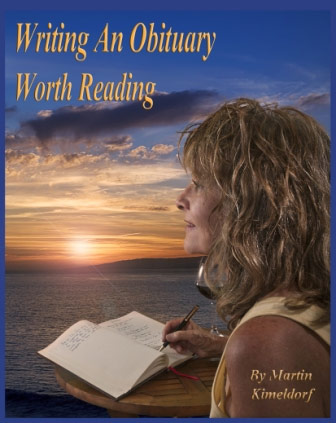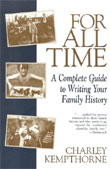Obituary Writing Pitfalls
Here are some pitfalls to avoid when writing an obituary.
The other pages of this website concentrate on what to do right. Make it accurate, make it lively. This page is about some pitfalls. One pitfall is making the obituary more about the people writing the obituary, rather than about the deceased. Another pitfall is making the obituary more about the death and funeral, rather than about the life. Still another is using clichés.
Do not make the obituary about the people writing it. Do not start off with “It is with sadness that the family announces . . .” Another said, "With deep feeling of sorrow, we said goodbye to our dearly loved . . ." I have even read (and wondered what the family was thinking): "With mixed emotions, we announce the peaceful passing of our mother . . ." Instead, make the obituary about the deceased, and the life they lived.
In the same way, think about life, rather than just the death and the immediate arrangements. For example, often the people who helped out in the final stages of life, and at the funeral, are thanked in the obituary. This is fine as far as it goes, but what about the people who helped out during the lifetime? Again, an excellent way to resolve these issues is to get more information from people before they die. Perhaps they would have wanted to thank those who made the food at the reception after the funeral, but they might also have wanted to thank that mentor at work, that friend, or that great Grade 5 teacher.
Avoid the pitfall of using clichés. The obituary you write does not have to sound like all the others. Just as resumés should not be filled with "I," there are expressions to avoid in obituaries. For example, instead of asking people to make a memorial donation, I have read obituaries that asked people as well to buy a friend a flower, fill out an organ donation card, or do a good deed.
Tips to Avoiding Pitfalls
- Do not start with “the family regrets to announce . . .” Instead, start with the deceased’s name and make the obituary about them.
- Do not reference the deceased back to the obituary author(s). For example, avoid saying “Mom" or "Dad.” Instead write about the deceased in the third person, as an individual.
- Do not say “after a courageous struggle . . .” Think about other ways to say this that do not sound like a cliché. Honor the deceased’s fight with their illness by describing it accurately and sensitively. How did they themselves describe this period of their life?
- Do not exclude the life. Describe more than just the final period of life and the death. Do not just thank those who helped with the care during the illness and dying and (if written afterwards) to those who helped at the funeral. Instead think of thanking those who helped out during the lifetime.
- Do not use abbreviations that could be unfamiliar.
- Do not say “in lieu of flowers . . .” Instead simply state your requests for memorial donations. As well, consider more creative ways.
- Do not forget to proofread, and proofread again.
See Also:
Obituaries – Delicate
Questions
Obituary Template
Obituary Writing Tips
Ordinary Lives,
Extraordinary Stories
Memoir
Writing: Ten Tips
A Family History Writing Workshop
More From Obituary Guide:
- Writing Your Own Obituary Offers Chance for Reflection
- How to Write a Legacy Letter (Ethical Will)
- A Family History Writing Workshop
- Helping Families "Most Satisfying Work" for Funeral Celebrant
- Be Prepared: Will, Health Care Directive (Living Will), and More
Books You May Find of Interest:
Not Quite What I Was Planning:
Six-Word Memoirs

Writing an Obituary Worth Reading:
A Guide to Writing a Fulfilling Life Review

Find the Good:
Unexpected Life lessons From a Small-Town
Obituary Writer

Having the Last Say:
Capturing Your Legacy in One Small Story

Obit:
Inspiring Stories of Ordinary People Who Led Extraordinary Lives
For All Time:
A Complete Guide to Writing Your Family History

Thrive:
The Third Metric to Redefining Success and Creating a Life of
Well-Being, Wisdom, and Wonder

Press Ctrl + D to Bookmark this page

